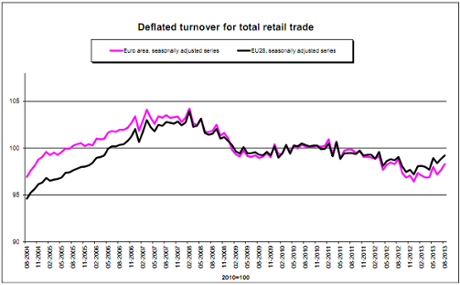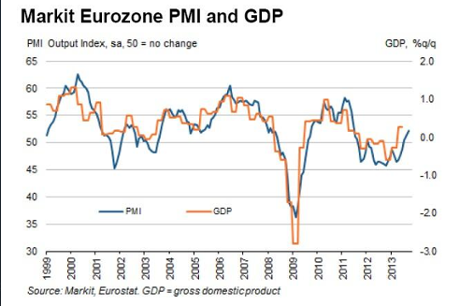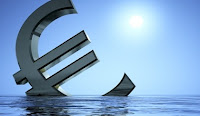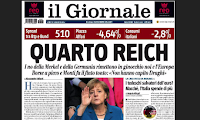 Angela Merkel's domestic policy in her third term
will likely be confined to higher spending. But she has grand plans for Europe.
SPIEGEL has learned she wants Brussels to have far more power over national
budgets. It's a risky move that EU partners and the Social Democrats are likely
to oppose.
Angela Merkel's domestic policy in her third term
will likely be confined to higher spending. But she has grand plans for Europe.
SPIEGEL has learned she wants Brussels to have far more power over national
budgets. It's a risky move that EU partners and the Social Democrats are likely
to oppose.
In the end, the atmosphere became downright festive in the Berlin Hall of the
Parliamentary Society, a building next to the Reichstag. Chancellor Angela
Merkel's conservatives and the center-left Social Democratic Party (SPD) had met
there three times in the last three weeks to sound out whether they could form a
coalition government. The decision was still up in the air.
Merkel gave SDP
Chairman Sigmar Gabriel a questioning look, and said: "Would you like to say
something?" But Gabriel beckoned to her to speak. "I have my delegation's
support for what we discussed," she said. "So do I," Gabriel replied.
The grand coalition took shape shortly before 3 p.m. last Thursday. For the
third time in postwar German history, Merkel's Christian Democratic Union,
together with its Bavarian sister party, the Christian Social Union (CSU), and
the SPD are preparing to form a coalition government. The talks are expected to
begin this Wednesday. The chancellor is in a hurry because she wants to have a
new government by Christmas at the latest. "Christmas will be here sooner than
you think," she told fellow members of the CDU executive board on Friday
afternoon. At the beginning of her third term, Merkel has more power in Germany and
Europe than any chancellor before her. There hasn't been such a strong majority
behind a government in Germany's parliament, the Bundestag, since the first
grand coalition half a century ago. In the midst of the European crisis, Germany
has become the undisputed dominant power in Europe.
The grand coalition will hand Merkel a majority she could use to shape
Germany and Europe and address major issues, including constitutional reforms in
Germany and the reform of European Union institutions.
Merkel, unlike SPD Chairman Gabriel, has been unchallenged in her own party
since her election victory. Little is left of the accusations that critics had
leveled at Merkel, except one: That she is a chancellor without an agenda, plan
or vision; that her style of government is reactive rather than proactive; and
that she doesn't know where she wants to take her government and Germany.
Big Plans for Europe - In the past, Merkel has treated governing primarily as repair work. The major
issues of her first two terms in office, the financial crisis and the fight to
save the euro, were suitable for that approach. Will that change, now that she
has the necessary power and means? Hardly at all, when it comes to Germany.
There are no major reforms in the works at government ministries, and the grand
coalition will focus on increasing spending to fulfil some of the parties'
campaign promises.
In contrast, officials at the Chancellery are forging plans for Europe that
are practically visionary for someone like Merkel. If she prevails, they will
fundamentally change the European Union. The goal is to achieve extensive,
communal control of national budgets, of public borrowing in the 28 EU capitals
and of national plans to boost competitiveness and implement social reforms. The
hope is that these measures will ensure the long-term stability of the euro and
steer member states onto a common economic and fiscal path. This would be the
oft-invoked and ambitious political completion of Europe's monetary union -- a
huge achievement.
It isn't a new goal, but what is new is the thumbscrews Brussels will be
allowed to apply if Merkel has her way, including sooner and sharper controls
and veto rights, as well as contractually binding agreements and requirements.
In short, this would amount to a true reconstruction of the euro zone and a
major step in the direction of an "economic government" of the sort the SPD too
would like to see put in place.
Germany's current economic strength helps to explain these visions for
Europe, since stricter budget controls wouldn't pose a threat to Berlin at the
moment. Jobless levels are so low that the country has almost reached full
employment, and the budget is in good shape, at least at the national government
level. In fact, public coffers are so full that the government can afford to
boost domestic spending.
More Money to Spend - And that's precisely what the members of that coalition intend to do. The
first item on their agenda is to hand out benefits and spend money. Thanks to
the strong economy, this won't even require raising taxes. In his financial
planning for the medium term, Finance Minister Wolfgang Schäuble anticipates
growing national budget surpluses from the year after next: €200 million ($274
million) in 2015, €5.2 billion in 2016 and €9.6 billion in 2017.
In other words, the government will have an additional €15 billion at its
disposal in the coming years. This gives Merkel and Schäuble the necessary
leeway to fulfill the desires of the CDU/CSU and the SPD for more investment in
infrastructure and education without having to raise taxes. There is talk of an
€11 billion fund for infrastructure alone.
Prior to the election, Merkel and Schäuble had announced their intention to
use the surpluses to pay off old debts. That won't happen now, and yet the
conservatives are not plagued by a guilty conscience, noting that despite the
additional spending plans, the country will still remain within its debt limit
requirements.
The reorganization of the financial relationships between the national and
regional state governments, which is on the agenda in this term, will likely be
costly for the national government. Many states would have to cut billions from
their budgets so that they can make do without new borrowing starting in 2020.
Many state governors complain that it's a burden their states can't handle
without national government assistance. They are hell-bent on demanding
financial support from Berlin in return for agreeing to a reform of the system
of transfer payments from richer to poorer German states.
The states' ability to block legislation in the Bundesrat, the legislative
body that represents the states, will likely become costly for the new
administration long before that. Merkel is worried at the way in which
preliminary coaltion talks in recent weeks turned into haggling over money
between the national and state governments. "We just had a national
parliamentary election, not 16 state parliamentary elections," an irritated
Merkel recently told the CDU/CSU parliamentary group.
There may also be a major restructuring in the way transport projects are
funded, due to the states' lack of money. The CSU's pet project, the automobile
toll, stands a good chance of being approved, since it would generate new
revenues.
More Powers For European Commission - During the negotiations, CSU Chairman Horst Seehofer presented a plan for how
the toll could become a reality. It calls for drivers to pay an "infrastructure
fee" in the future. Germans would be able claim the fee as a credit against the
motor vehicle tax, so that the cost could ultimately be imposed on foreign
drivers. According to the document, prepared by Transportation Minister Peter
Ramsauer, this would be possible under European law. The new coalition won't face serious resistance to its spending policies, not
even from the opposition. With the elimination of the pro-business Free
Democratic Party (FDP) from the Bundestag, the voice of moderation in budget
policy has disappeared. Only the economic wing of the CDU/CSU is likely to put
up weak resistance. So Seehofer will get his toll, the states will be kept happy with financial
gifts and the social security offices will hand out benefits. This doesn't
exactly sound like an ambitious program for Merkel's second coalition government
with the Social Democrats. Instead, it feels like more of the same, or a program
of minor improvements, at least on the home front. But regarding Europe, Merkel is heading for strategic decisions and is
likely to show more courage to take political risks than usual.
Schäuble, the last dyed-in-the-wool European among Germany's top
policymakers, can be pleased. Merkel wants tangible amendments to the European
Union treaties: more power for Brussels, and even more power for the
much-criticized European Commission. "Unfortunately, there is no other option,"
say government officials.
Carrot-And-Stick Approach - Last Thursday, after the final round of exploratory talks with the SPD,
Merkel brought European Council President Herman Van Rompuy into the loop in a
private conversation at the Chancellery. It was a back-door initiative of the
kind so typical in EU policymaking. Documents are already being put together at
the German Finance Ministry over how "Protocol 14" of the EU Treaty could be
beefed up. It currently contains a few general statements on cooperation in and
control of the euro zone. But now, if Berlin is able to implement its
carrot-and-stick approach, tangible powers for the European Commission will be
added to the protocol.
For instance, the Commission could be given the right to conclude, with each
euro country, an agreement of sorts to improve competitiveness, investments and
budgetary discipline. Such "contractual arrangements" would be riddled with
figures and deadlines, so that they could be monitored and possibly even
contested at any time. In return, a new, long-discussed Brussels budget will
become available to individual countries, an additional euro-zone budget with
sums in the double-digit billions for obedient member states. Protocol 14 could also be used to install the full-time head of the Euro
Group. The influential job is now held by one the member states' finance
ministers, currently Dutch Finance Minister Jeroen Dijsselbloem. Devoted
Europeans like Schäuble have long dreamed of installing a "euro finance
minister."
Resistance Against Merkel's European Plans - If Chancellor Merkel is focusing on an amendment of this central part of the
EU treaties, it is a remarkable about-face. Still, the new course is risky, and
it has many detractors and an uncertain outcome. None of this is to the
chancellor's taste, at least not the chancellor we know. But Merkel has already
deployed her key European strategist. The relevant department head in the
Chancellery, Nikolaus Meyer-Landrut, outlined the German plan at a Brussels
meeting in early October. It didn't go down very well. Opponents of the common currency are rapidly gaining popularity in almost all
euro countries. Every change in the balance of power in Europe and every
upgrading of the European Commission make governments more vulnerable to
domestic political attacks. More power for "Brussels?" No way. There are even growing doubts in the European Parliament, albeit for
completely different reasons. Both leftists and conservatives fear that anyone
who opens the door to amending the treaties "won't be able to close it again
that quickly," says a top Christian Democrat. Especially the British government,
driven by the radical, anti-European UK Independence Party (UKIP), could use the
opportunity to retrieve powers from Brussels, essentially renationalizing the
European Union.
The SPD could raise objections. "The SPD won't support any arrangements if
Merkel conducts parallel negotiations with Britain's David Cameron to transfer
EU powers back to member states," Axel Schäfer, deputy leader of the SPD's
parliamentary group, told SPIEGEL ONLINE. He added that the SPD won't accept any
treaty changes that relate to referendums in individual EU states.
The
president of the European Parliament, German Social Democrat Martin Schulz, has
already warned Merkel privately that he won't back any change in EU treaties. He
wants national governments to make the euro zone resilient to future crises by
using the instruments created step-by-step over the last three years -- without
treaty changes. Schulz fears that a treaty change would take too long and that
referendums necessary in some countries couldn't be won given current poor
public sentiment regarding the EU. "We will check all the chancellor's proposals
to see whether they can be implemented in all EU states," says Schulz, who will
be part of the SPD's negotiating team in the coalition talks, responsible for
all issues pertaining to Europe.
But Merkel seems undaunted by these obstacles. And she already has a
timetable. First she wants to wait and see what happens in the May 2014 European
parliamentary election. Then the new president of the European Commission will
have to be chosen once the second term of the current incumbent, José Manuel
Barroso, ends in 2014. Merkel got him the job and ensured he got a second term.
But these days, she doesn't even bother disguising her contempt for Barroso.
Once the new European Commission is in office, the political window for
Merkel's European vision is expected to open. It doesn't seem to bother her that
she will be in a clear minority when she embarks on her reform plans. She is
familiar with this position from the first days of the euro debt crisis, when
she wanted to include the International Monetary Fund as a key authority in
distributing aid packages, and almost all other euro countries were against the
idea. At the time, she said privately: "I'm pretty much alone here. But I don't
care. I'm right."
NIKOLAUS BLOME, CHRSTIANE HOFFMANN, PETER MÜLLER,
CHRISTIAN REIERMANN, GORDON REPINSKI, CHRISTOPH SCHULT
 Despite the evidence that migrants from the Middle East and Africa are continuing to flee war and poverty in their home countries and will strike out to Europe again in huge numbers this year, European leaders have taken no major new steps to curb the flow. Nor have they agreed on a comprehensive border policy or prepared for another influx that could rival last year’s, when more than a million asylum seekers reached the Continent, many of them headed to Germany. Prime Minister Manuel Valls of France issued a stark warning in an interview broadcast on Friday about the future of a unified Europe, saying the very idea was under threat unless the Continent could protect its borders. Speaking to the BBC at the World Economic Forum in Davos, Switzerland, Mr. Valls said the Continent could not accommodate the enormous numbers of migrants and warned that they could destabilize European societies. “If Europe is not capable of protecting its own borders, it’s the very idea of Europe that will be questioned,” he said. “Europe has forgotten that borders are required.” The Schengen zone, which permits largely unchecked movement across most of the Continent and was described by Mr. Valls as “one of the great European projects,” has been under severe strain as countries have introduced border controls aimed at stemming the flow of migrants.
Despite the evidence that migrants from the Middle East and Africa are continuing to flee war and poverty in their home countries and will strike out to Europe again in huge numbers this year, European leaders have taken no major new steps to curb the flow. Nor have they agreed on a comprehensive border policy or prepared for another influx that could rival last year’s, when more than a million asylum seekers reached the Continent, many of them headed to Germany. Prime Minister Manuel Valls of France issued a stark warning in an interview broadcast on Friday about the future of a unified Europe, saying the very idea was under threat unless the Continent could protect its borders. Speaking to the BBC at the World Economic Forum in Davos, Switzerland, Mr. Valls said the Continent could not accommodate the enormous numbers of migrants and warned that they could destabilize European societies. “If Europe is not capable of protecting its own borders, it’s the very idea of Europe that will be questioned,” he said. “Europe has forgotten that borders are required.” The Schengen zone, which permits largely unchecked movement across most of the Continent and was described by Mr. Valls as “one of the great European projects,” has been under severe strain as countries have introduced border controls aimed at stemming the flow of migrants. Despite the evidence that migrants from the Middle East and Africa are continuing to flee war and poverty in their home countries and will strike out to Europe again in huge numbers this year, European leaders have taken no major new steps to curb the flow. Nor have they agreed on a comprehensive border policy or prepared for another influx that could rival last year’s, when more than a million asylum seekers reached the Continent, many of them headed to Germany. Prime Minister Manuel Valls of France issued a stark warning in an interview broadcast on Friday about the future of a unified Europe, saying the very idea was under threat unless the Continent could protect its borders. Speaking to the BBC at the World Economic Forum in Davos, Switzerland, Mr. Valls said the Continent could not accommodate the enormous numbers of migrants and warned that they could destabilize European societies. “If Europe is not capable of protecting its own borders, it’s the very idea of Europe that will be questioned,” he said. “Europe has forgotten that borders are required.” The Schengen zone, which permits largely unchecked movement across most of the Continent and was described by Mr. Valls as “one of the great European projects,” has been under severe strain as countries have introduced border controls aimed at stemming the flow of migrants.
Despite the evidence that migrants from the Middle East and Africa are continuing to flee war and poverty in their home countries and will strike out to Europe again in huge numbers this year, European leaders have taken no major new steps to curb the flow. Nor have they agreed on a comprehensive border policy or prepared for another influx that could rival last year’s, when more than a million asylum seekers reached the Continent, many of them headed to Germany. Prime Minister Manuel Valls of France issued a stark warning in an interview broadcast on Friday about the future of a unified Europe, saying the very idea was under threat unless the Continent could protect its borders. Speaking to the BBC at the World Economic Forum in Davos, Switzerland, Mr. Valls said the Continent could not accommodate the enormous numbers of migrants and warned that they could destabilize European societies. “If Europe is not capable of protecting its own borders, it’s the very idea of Europe that will be questioned,” he said. “Europe has forgotten that borders are required.” The Schengen zone, which permits largely unchecked movement across most of the Continent and was described by Mr. Valls as “one of the great European projects,” has been under severe strain as countries have introduced border controls aimed at stemming the flow of migrants.





 The Met Office have issued this prediction for the storm (MET OFFICE)
The Met Office have issued this prediction for the storm (MET OFFICE) 













